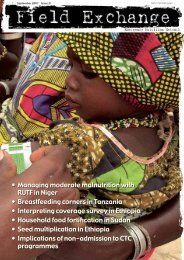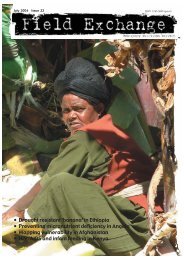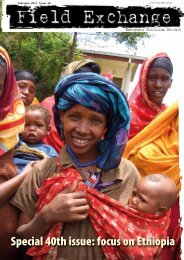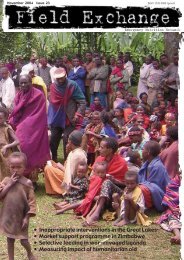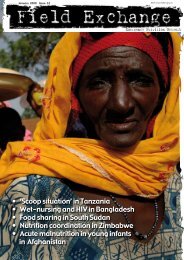Download a PDF of this issue - Field Exchange - Emergency ...
Download a PDF of this issue - Field Exchange - Emergency ...
Download a PDF of this issue - Field Exchange - Emergency ...
You also want an ePaper? Increase the reach of your titles
YUMPU automatically turns print PDFs into web optimized ePapers that Google loves.
<strong>Field</strong> article<br />
to the final destinations. WFP supports national<br />
surveys (e.g. the Comprehensive Food Security<br />
and Vulnerability Assessment) and provides<br />
technical support to government, such as<br />
during the development <strong>of</strong> national policies<br />
and protocols for CMAM and guidelines for<br />
IYCF.<br />
The World Health Organisation (WHO)<br />
provides technical support to government for<br />
development <strong>of</strong> standards, guidelines and<br />
monitoring systems, such as the implementation<br />
<strong>of</strong> the 2006 growth standards and the<br />
development <strong>of</strong> new child growth cards. WHO<br />
has also provided support for nutritional<br />
surveillance by integrating nutrition indicators<br />
into the Health Management Information<br />
System (HMIS).<br />
NGOs provide support in the following areas:<br />
• For OTP and SC services, some international<br />
NGOs (INGOs) support the management<br />
<strong>of</strong> malnourished cases in their operational<br />
areas, which includes provision <strong>of</strong><br />
training and capacity building <strong>of</strong> district<br />
staff, supplies for government PHUs and<br />
logistics for outreach services. Some INGOs<br />
also provide logistic support for RUTF<br />
distribution.<br />
• For SFP services, the INGOs transport food<br />
supplies from the WFP district warehouses<br />
to the PHUs, train PHU staff in managing<br />
effective distributions, preparation <strong>of</strong> the<br />
food and accurate reporting.<br />
• For community mobilisation for CMAM,<br />
support is provided by INGOs and local<br />
NGOs through provision <strong>of</strong> training for<br />
CHVs in how to conduct screening and<br />
refer identified malnourished children to<br />
the treatment centres.<br />
Strong partnerships have emerged between the<br />
MOHS, UN agencies, NGOs and faith based<br />
organisations (FBOs) involved in CMAM<br />
implementation. Other partners who provide<br />
CMAM services are Médecins Sans Frontières<br />
(MSF) (NGO), Magbente (FBO) and Panguma<br />
(FBO). Technical support to training has been<br />
provided by Valid International. Three international<br />
NGOs partnering with WFP – Africare,<br />
Plan International and World Vision<br />
International – are now distributing and monitoring<br />
SFP commodities and giving technical<br />
support to health facility staff. These partnerships<br />
can be further exploited for implementation<br />
<strong>of</strong> preventive nutritional interventions.<br />
Advocacy<br />
The MOHS and Ministry <strong>of</strong> Agriculture,<br />
Forestry and Food Security with the support <strong>of</strong><br />
NGOs and UN REACH partners (UNICEF,<br />
WHO, FAO, WFP) conducted a comprehensive<br />
situation analysis <strong>of</strong> nutrition and food security<br />
in 2011. The conclusions <strong>of</strong> <strong>this</strong> analysis were<br />
shared with multi-sector stakeholders in a<br />
national nutrition and food security forum and<br />
in all regions in the country. Important gaps<br />
and opportunities for scaling up nutrition and<br />
food security interventions were identified<br />
during <strong>this</strong> process. The national forum was<br />
launched by the Minister <strong>of</strong> Information and<br />
Communication, who deputised for the<br />
President <strong>of</strong> Sierra Leone. The participants<br />
included senior government ministers, senior<br />
government <strong>of</strong>ficials, decision makers from the<br />
UN, development partners, NGOs and senior<br />
technical personnel from the represented<br />
organisations. These fora have given visibility<br />
to the <strong>issue</strong>s <strong>of</strong> malnutrition and food insecu-<br />
rity at national and regional level, which will<br />
lead to more support for these programmes at<br />
both levels.<br />
Intense advocacy to the MOHS and senior<br />
health <strong>of</strong>ficials was undertaken in 2010 for the<br />
inclusion <strong>of</strong> CMAM into the Free Health Care<br />
Initiative. The advocacy led by UNICEF and the<br />
MOHS Nutrition Programme was successful<br />
and resulted in the inclusion <strong>of</strong> CMAM<br />
supplies in the essential drug/food list.<br />
Anticipated benefits <strong>of</strong> <strong>this</strong> are ease <strong>of</strong> clearing<br />
imported supplies through the port, procured<br />
commodities can be stored in government<br />
central medical stores (treated the same as any<br />
other drug), and government can take on a<br />
bigger role in the distribution and logistical<br />
management <strong>of</strong> the supplies.<br />
Another important advocacy event was the<br />
launching <strong>of</strong> the first CMAM protocol by the<br />
First Lady in 2008 during ‘Breastfeeding week’.<br />
As CMAM relies on community support for its<br />
success, advocacy for community leaders to<br />
support CMAM is ongoing, <strong>of</strong>ten led by NGOs<br />
(when present in the area).<br />
Coordination<br />
The MOHS takes the lead in coordinating all<br />
the health sector partners. The coordination<br />
mechanisms within the health system relevant<br />
to the CMAM programme are indicated in<br />
Table 1. The MOHS has developed an overarching<br />
National Health Sector Strategic Plan<br />
(NHSSP) that has six pillars designed to ensure<br />
effective implementation <strong>of</strong> the national health<br />
priority areas. These are leadership and governance,<br />
service delivery, human resources,<br />
health financing, medical products and technologies<br />
and health information. UNICEF also<br />
holds quarterly coordination meetings with the<br />
NGO implementing partners to monitor and<br />
share updates on CMAM implementation.<br />
While sufficient coordination mechanisms<br />
are in place, they are faced with various challenges<br />
such as irregularity <strong>of</strong> meetings, poor<br />
representation and poor time management. For<br />
example, the Interagency Coordinating<br />
Committee (ICC) and Technical Coordinating<br />
Committee (TCC) for Reproductive and Child<br />
Health (RCH) meetings have not always been<br />
regularly held in the ministry due to time<br />
constraints.<br />
Implementation<br />
To implement CMAM at-scale, sufficient<br />
numbers <strong>of</strong> health personnel and facilities must<br />
Table 1: Coordination mechanisms under the MOHS<br />
Coordination<br />
Mechanism<br />
Convenor Regularity <strong>of</strong><br />
meetings<br />
Health Sector<br />
Coordinating<br />
Committee<br />
Health Sector Steering<br />
Group<br />
Health Sector Working<br />
Groups<br />
Nutrition Coordinating<br />
Committee<br />
Nutrition Technical<br />
Committee<br />
Technical Coordinating<br />
Committee (TCC) for<br />
RCH<br />
District Partners<br />
Committee<br />
Details<br />
Minister Quarterly Highest health policy coordinating body, members include<br />
heads <strong>of</strong> line ministries, departments and agencies.<br />
Chief Medical<br />
Officer<br />
Bi-Weekly<br />
This coordinates the work <strong>of</strong> the technical working group.<br />
Members include donors, chairmen <strong>of</strong> sector working<br />
groups. INGOs and national NGOs, CSOs, UN Agencies.<br />
MOHS/Partners Bi-Weekly Senior <strong>of</strong>ficers <strong>of</strong> partner agencies with interest and<br />
expertise relating to the six pillars <strong>of</strong> the NHSSP.<br />
Nutrition<br />
Manager<br />
Nutrition<br />
Manager<br />
Chief Medical<br />
Officer<br />
District<br />
Medical Officer<br />
Quarterly<br />
Monthly<br />
Monthly<br />
Monthly<br />
be trained and equipped. Additionally, community<br />
mobilisation must be conducted and<br />
logistic systems organised such that uninterrupted<br />
supplies can be provided to implement<br />
the programme, as discussed below.<br />
Health personnel<br />
To ensure sufficient numbers <strong>of</strong> skilled health<br />
personnel during the roll out <strong>of</strong> CMAM, two<br />
strategies were applied: the hiring <strong>of</strong> new staff<br />
and capacity building <strong>of</strong> existing staff. The new<br />
staff included government nutritionists, up<br />
from six (in four districts) in 2007, to 16 (in nine<br />
districts) in 2010. The National Nutrition<br />
Programme also established two positions with<br />
support from UNICEF, a CMAM Officer and an<br />
IYCF Officer to coordinate, monitor and evaluate<br />
these separate field activities nationwide. In<br />
addition to the government employed nutritionists,<br />
partner NGOs hired a total <strong>of</strong> 12<br />
nutritionists to assist with effective CMAM<br />
implementation in 2010. The total number <strong>of</strong><br />
nutritionists in the CMAM programme in<br />
Sierra Leone currently stands at 14.<br />
Since 2007, considerable effort has been<br />
expended on training many MOHS staff in the<br />
management <strong>of</strong> acute malnutrition for SC, OTP<br />
and SFP service provision. The majority <strong>of</strong><br />
trainings were sponsored by UNICEF with<br />
technical support from Valid International,<br />
WFP and WHO. Some INGOs have also<br />
provided training for health staff in their operational<br />
districts e.g. Action Contre la Faim<br />
(ACF) in Moyamba for SFP, and MSF in Bo for<br />
OTP and SC service provision. The details <strong>of</strong><br />
trainings conducted to date are indicated below<br />
in Tables 2 and 3.<br />
Tools developed to support the training <strong>of</strong> staff<br />
include:<br />
• The first version <strong>of</strong> the CMAM guidelines<br />
and protocol was developed in 2007 and<br />
validated in 2009. A revised version was<br />
developed in 2010 following the adoption <strong>of</strong><br />
the WHO growth standards.<br />
• Booklets <strong>of</strong> handouts were produced and<br />
used for the Training <strong>of</strong> Trainers (ToT) and<br />
cascade training <strong>of</strong> health staff on CMAM<br />
in 2010. The booklets contain extracts from<br />
the revised protocol.<br />
CMAM facilities<br />
The programme has gradually been scaled up<br />
from the initial five OTPs in four districts <strong>of</strong> the<br />
pilot project in 2007 with the establishment <strong>of</strong><br />
more OTPs, SCs and SFPs in all districts.<br />
Technical participation <strong>of</strong> organisations active in nutrition<br />
such as the government ministries, UN and NGOs.<br />
Small taskforce comprising <strong>of</strong> technical agencies in<br />
nutrition that supports the Nutrition Programme.<br />
A forum for all technical managers and implementing<br />
partners conducting RCH activities countrywide, such as<br />
UNFPA, International Rescue Committee (IRC), WHO.<br />
Coordinates district health implementing partners.<br />
41



